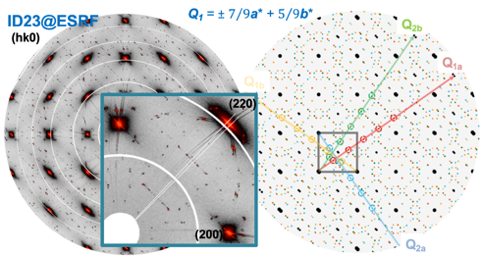Study level
BAC +4
ECTS
6 credits
Component
Faculty of Science
Description
The structural characterization of Materials is a mandatory prerequisite to develop functional materials and an absolute must for materials science researchers and engineers. For the interpretation of diffraction patterns, structures, microstructures etc., a detailed knowledge in crystallography, structure analysis but equally of the instruments used is necessary. The necessary knowledge is developed from the scratch, progressively yielding an understanding on how to characterize materials by standard and sophisticated diffraction methods. The lecture also includes lab work on powder and single crystal diffractometers, allowing to acquire the competencies to correctly use and interpret diffraction data. The lecture during the1st semester involves essentially X-ray diffraction as well as electron microscopy, while the crystallography part continues during the2nd semester with symmetry, structure solution and structure refinements as well as neutron scattering and magnetic structure analysis.
This lecture contains 2 parts:
(1): Crystallography: Simple inorganic structures: basics & concepts, Fractional atomic coordinates and projections, Bravais lattices, Crystal systems, Lattice points, lines and planes, Miller indices, Zone equation, Wulff net, orienting matrix, Crystal growth and morphology, X-ray sources, interaction of X-rays, electrons and neutrons with matter, scattering lengths, structure factor, systematic extinctions, Debye-Waller factor, principles of scattering, reciprocal lattice, concept of Ewald sphere, Laue diffraction, Debye Scherrer camera, powder diffractometers, single crystal diffractometers, monochromators, detectors, resolution, stereographic projection, peak intensities, reflection profile broadening and grain size,
(2): Electron microscopy:
In this part, we will be interested in electron microscopy through flipped classes. We will discuss the following topics: Electron sources, lens and aberrations, sample preparation, electron diffraction, Structural and chemical analysis, Imaging techniques.

Hourly volumes* :
CM: 34
TD:18
Objectives
Introduction into basic crystal chemistry and structural characterization of condensed matter by diffraction methods.
The objectives of the transmission electron microscopy part is to give solid knowledge in electron microscopy in order to be able to use appropriate methods for the characterization of materials. The expected skills for this part are knowing in detail the principles of an electron microscope (scanning and transmitted beam) and to be able to describe and schematize the device and its specificities.
Students will get familiarized with diffraction methods and able to interpret X-ray powder and single crystal diffraction patterns which are analyzed by hand as well as by using state of the art programs.
The use of the flipped class promotes student engagement and investment. This way of working is interesting to take possession of the knowledge and pass it on to the class.
Knowledge control
CC integral
Syllabus
Crystallography:
Simple inorganic structures: basics & concepts, Fractional atomic coordinates and projections, Bravais lattices, Crystal systems, Lattice points, lines and planes, Miller indices, Zone equation, Wulff net, orienting matrix, Crystal growth and morphology, X-ray sources, interaction of X-rays, electrons and neutrons with matter, scattering lengths, structure factor, systematic extinctions, Debye-Waller factor, principles of scattering, reciprocal lattice, concept of Ewald sphere, Laue diffraction, Debye Scherrer camera, powder diffractometers, single crystal diffractometers, monochromators, detectors, resolution, stereographic projection, peak intensities, reflection profile broadening and grain size,
Electron microscopy:
In this part, we will be interested in electron microscopy through flipped classes. We will discuss the following topics: Electron sources, lens and aberrations, sample preparation, electron diffraction, Structural and chemical analysis, Imaging techniques.
Further information
Administrative contact(s) :
Secretariat Master Chemistry master-chimie @ umontpellier.fr @
Bibliography
- Transmission Electron Microscopy, A text book for materials Science, Davis B. Williams, C. Barry Carter
- Physical Principles of Electron Microscopy, Ray F. Egerton, Springer
- and C. McKie: Essentials of Crystallography, Blackwell Scientific Publications
- Borchardt-Ott: Crystallography: an introduction, Springer
- Als-Nielsen, D. McMorrow: Elements of Modern X-ray Physics

